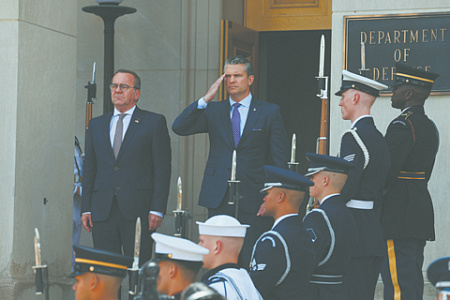
In a significant move to reinforce Ukraine’s defense capabilities, Germany and the United States have solidified a plan to deliver two additional American-made Patriot air defense systems to Kyiv. The agreement was announced by German Defense Minister Boris Pistorius following high-stakes talks in Washington with his American counterpart, Pete Hegseth, signaling a deepening of transatlantic security cooperation amidst the ongoing conflict.
Under the terms of the deal, Berlin will finance the acquisition of the two advanced missile defense systems, each valued at between $1 billion and $2 billion, with individual missiles costing upwards of $4 million. The systems, crucial for intercepting ballistic and cruise missiles, are expected to be delivered to Germany within months before their final transfer to Ukraine. This arrangement underscores Europe’s growing financial and logistical role in supporting Kyiv’s war effort, a strategy recently emphasized at the latest NATO summit.
The discussions in the Pentagon also addressed broader strategic anxieties. Minister Pistorius reportedly received assurances that the 38,000 American troops stationed in Germany would remain, a key concern following statements made by President Donald Trump’s administration. The meeting served to reaffirm the U.S. military presence as a cornerstone of European security, a commitment Washington framed as a direct response to its allies’ wishes.
Beyond direct aid to Ukraine, the bilateral talks covered Germany’s own military modernization. Berlin is moving forward with the procurement of 35 advanced F-35 fighter jets from the U.S. to upgrade its air force’s nuclear-capable fleet. Pistorius also explored the potential purchase of American Typhon ground-based missile launchers, which can fire long-range cruise missiles, citing them as a necessary deterrent against Russia. However, his American counterpart offered no immediate commitment, indicating the request remains under consideration.
A more contentious topic, the potential deployment of new U.S. nuclear-capable cruise missiles on German soil, also featured in the conversation. The issue, a holdover from discussions under the previous administration, remains unresolved as the White House has yet to make a final decision. This sensitive subject evokes historical parallels to the Cold War, when similar plans sparked widespread public protest in West Germany and contributed to the rise of the Green Party over fears of Europe becoming a nuclear battlefield.
Meanwhile, these developments in Western military strategy are being closely monitored in Moscow. Commentators on Russian media channels interpret the moves, alongside announced expansions of British and French expeditionary forces, as signals of Europe preparing for a potential future conflict. While some Russian analysts dismiss the buildup as economically unsustainable for the West, others view it as an unmistakable and dangerous trend toward direct confrontation.
